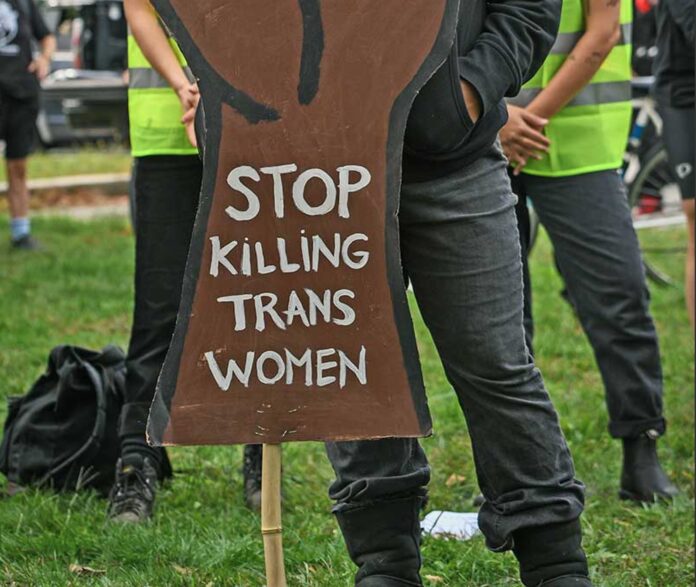Last month, in its supplemental hate crimes report, the FBI reported a total of two anti-Trans homicides in 2021 — even though a leading LGBTQ agency reported 59 violent Trans homicides for the same year.
The Human Rights Campaign, based in D.C., reported at least 59 Trans or gender-nonconforming violent deaths for 2021. However, HRC didn’t label the deaths as hate crimes.
The FBI compiles its data from thousands of law enforcement agencies throughout the country who report the information on a voluntary basis. The most recent year for FBI hate-crime statistics is 2021.
Since 1990, federal law strongly encourages local police departments to report hate crimes based on sexual orientation among other categories. In 2009, federal law added the categories of gender and gender identity as reporting categories for local police departments.
After the mass shootings in Nashville involving a shooter who happened to be Trans, right-wing extremists stereotyped the Trans community as being prone to violence — rather than being victims of violence. To support their claims, prolific Transphobes such as podcaster Matt Walsh cited the FBI statistic of only two anti-Trans homicides in 2021.
HRC was asked about concerns of underreporting by the FBI regarding anti-Trans hate crimes.
“HRC is concerned with underreporting at multiple levels, but we do our due diligence to ensure that our reporting reflects ‘at least’ the given number of people killed in a year due to un/misreporting,” said Shoshana Goldberg, HRC’s public education and research director. “In our 2022 report, ‘An Epidemic of Violence 2022: Fatal Violence Against Transgender and Gender Non-Conforming People in the United States in 2022,’ we found that over the last decade of tracking (2013-2022), 7 in 10 Transgender and gender non-confirming victims of fatal violence were initially misgendered by the media or police.”
David Stacy, HRC’s government affairs director, said HRC urges Congress to make hate-crimes reporting by local police mandatory rather than voluntary. “Frontline law enforcement officers are key to appropriately handling hate crimes and every department has a responsibility to perform this crucial police work,” he added. “HRC urges Congress to make this reporting mandatory to ensure under-reporting and non-reporting jurisdictions are held accountable for their failings.”
Stacy also said LGBTQ+ leaders can play a role in helping the effort. “Many jurisdictions take hate crimes reporting seriously, but it’s still important for LGBTQ+ community leaders to engage with their local law enforcement to demand they make hate crime enforcement a priority,” Stacy concluded.
Goldberg noted that combating hate crimes requires more than accurate reporting. “Bias crime statistics are important, yes, but they are not the full story,” Goldberg asserted. “The reality is, we already know that Transgender people — and Black and Brown Trans women in particular — are at increased risk for fatal violence, hate crimes, violence, and harassment. Law enforcement and policy makers wishing to address this epidemic of violence need to not just focus on enhanced and improved reporting, but also on making a wide range of systemic changes to reduce the marginalization faced by the Transgender community.”
A spokesperson for the FBI issued the following statement for this story:
“The FBI cannot comment on a comparison of statistics released by another agency. The accuracy of the statistics released by the FBI’s Uniform Crime Reporting (UCR) Program is based on data contributors’ adherence to national standards. The FBI’s UCR Program works closely with states to ensure agencies submit data to the FBI in strict compliance with FBI’s UCR guidelines. It is the responsibility of each state UCR program or contributing law enforcement agency to submit accurate statistics and correct existing data that are in error. The FBI’s Criminal Justice Information Services Division conducts Quality Assurance Reviews to assess data to ensure compliance with program requirements. Further, the FBI provides training for any participating law enforcement agency requesting it. This provision assists the agency in ensuring uniformity of crime data and adds another opportunity for quality control.
“The presence of bias alone does not necessarily mean a crime can be considered a hate crime. Only when a law enforcement investigation reveals sufficient evidence to lead a reasonable and prudent person to conclude the offender’s actions were motivated, in whole or in part, by their bias, should an agency report an incident as a hate crime. The FBI meets with law enforcement agencies regularly to discuss issues related to crime reporting and provides updated training.”
Cpl. Jasmine Reilly, a spokesperson for the Philadelphia Police Department, said the department never has reported a Trans homicide as a hate crime to the Pennsylvania State Police and/or the FBI.
There are three unsolved Trans homicides since 2010 that might be reported as hate crimes in the future, depending on further findings relating to their respective investigations, Reilly added.
“Of course we can always look to improve,” Reilly told PGN. “Policing has changed and we’re always looking for the best way to investigate and police that encapsulates best practices. What I will say with Transgender crimes: With our new reporting system, we’re making sure that hate crimes are plainly marked. The new system takes away the guesswork. It’s definitely a step in the right direction. The PPD is looking at ways we can improve the way we report so that we can be more descriptive in how we report crime so that it captures all aspects of a crime.”
Kris Tassone, policy counsel for the National Center for Transgender Equality, expressed concern about underreporting of anti-Trans hate crimes across the board.
“We can’t get an adequate handle on any situation until we know what’s happening,” Tassone told PGN. “Until law enforcement has accurate counts, accurate reporting and complete reporting, they won’t know the scope of the violence that Trans people face every day.”
